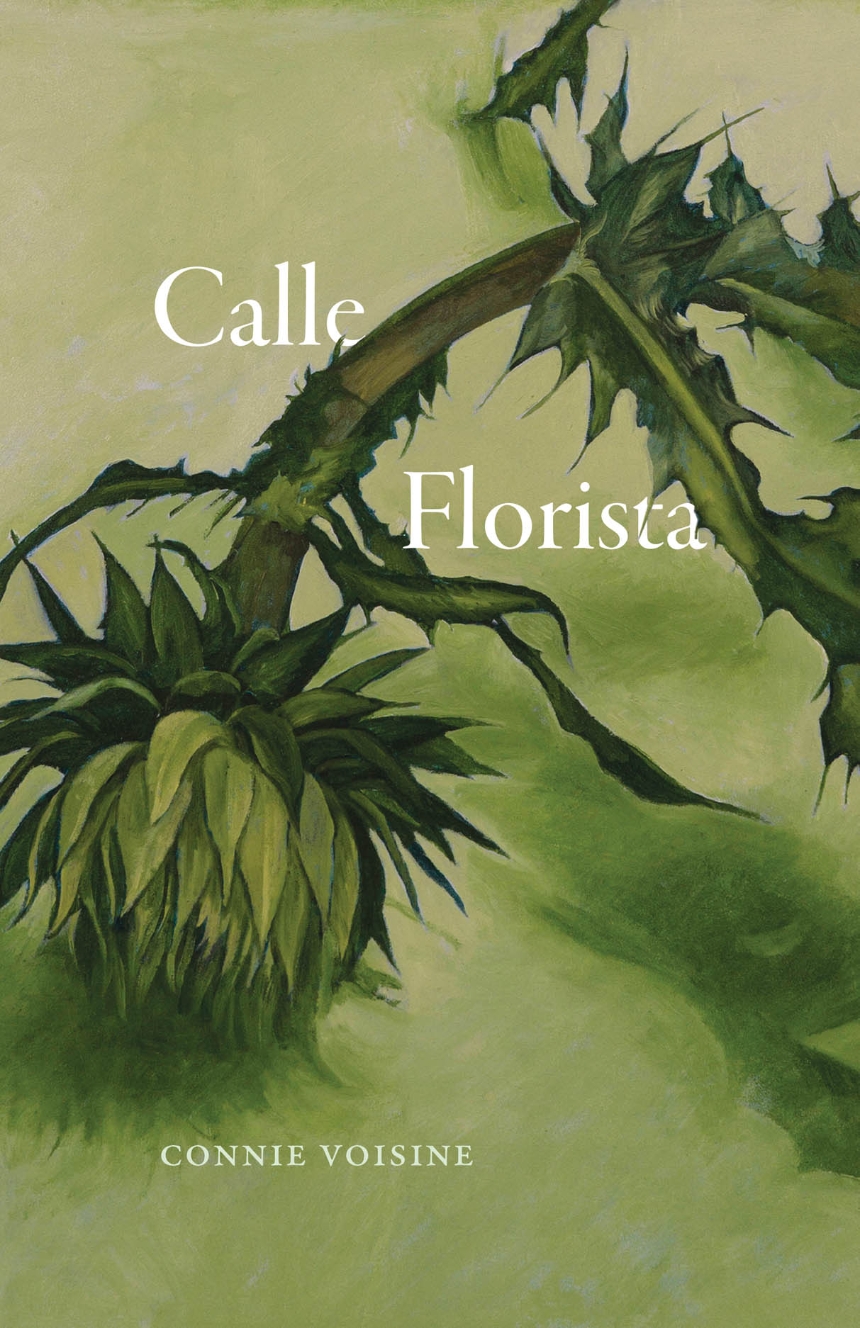Calle Florista
This World and That One
Sometimes you defy it,
I am not that, watching a stranger
cry like a dog when she thinks she’s alone
at the kitchen window, hands forgotten
under the running tap.
The curtains blow out, flap the other side of the sill.
In you one hole fills another,
stacked like cups.
You remember your hands.
Connie Voisine’s third book of poems centers on the border between the United States and Mexico, celebrating the stunning, severe desert landscape found there. This setting marks the occasion as well for Voisine to explore themes of splitting and friction in both human and political contexts. Whose space is this border, she asks, and what voice can possibly tell the story of this place?
In a wry, elegiac mode, the poems of Calle Florista take us both to the edge of our country and the edge of our faith in art and the world. This is mature work, offering us poems that oscillate between the articulation of complex, private sensibilities and the directness of a poet cracking the private self open—and making it vulnerable to the wider world.
Sometimes you defy it,
I am not that, watching a stranger
cry like a dog when she thinks she’s alone
at the kitchen window, hands forgotten
under the running tap.
The curtains blow out, flap the other side of the sill.
In you one hole fills another,
stacked like cups.
You remember your hands.
Connie Voisine’s third book of poems centers on the border between the United States and Mexico, celebrating the stunning, severe desert landscape found there. This setting marks the occasion as well for Voisine to explore themes of splitting and friction in both human and political contexts. Whose space is this border, she asks, and what voice can possibly tell the story of this place?
In a wry, elegiac mode, the poems of Calle Florista take us both to the edge of our country and the edge of our faith in art and the world. This is mature work, offering us poems that oscillate between the articulation of complex, private sensibilities and the directness of a poet cracking the private self open—and making it vulnerable to the wider world.
Reviews
Table of Contents
Acknowledgments
Calle Florista
As Well As You Can
The Internal State of Texas
We Are Crossing Soon
Rules for Drought
What Is True Is You’re Not Here
Say Uncle
New World
I admit that I believe ideas exist regardless
Annunciation
Pilgrims
Testament
Summertime
You Will Come to Me across the Desert
Gravid
Midnight in the House
This World and That One
After the First Road
After
Two Years in That City
Once
Psalm to Whoever Is Responsible
A world’s too little for thy tent, a grave too big for me
Ambidextrous
Prayer of the St. of the Hottest Night in Las Cruces
To the Crickets Which Sing in Unison
Ubi sunt qui ante nos fuerunt?
RIP
The Altar by George Herbert
Spanish Language in Mexico, 1993
In the Shade
Unfinished Letter to Death
The Self after Modernism
Notes
Calle Florista
As Well As You Can
The Internal State of Texas
We Are Crossing Soon
Rules for Drought
What Is True Is You’re Not Here
Say Uncle
New World
I admit that I believe ideas exist regardless
Annunciation
Pilgrims
Testament
Summertime
You Will Come to Me across the Desert
Gravid
Midnight in the House
This World and That One
After the First Road
After
Two Years in That City
Once
Psalm to Whoever Is Responsible
A world’s too little for thy tent, a grave too big for me
Ambidextrous
Prayer of the St. of the Hottest Night in Las Cruces
To the Crickets Which Sing in Unison
Ubi sunt qui ante nos fuerunt?
RIP
The Altar by George Herbert
Spanish Language in Mexico, 1993
In the Shade
Unfinished Letter to Death
The Self after Modernism
Notes
